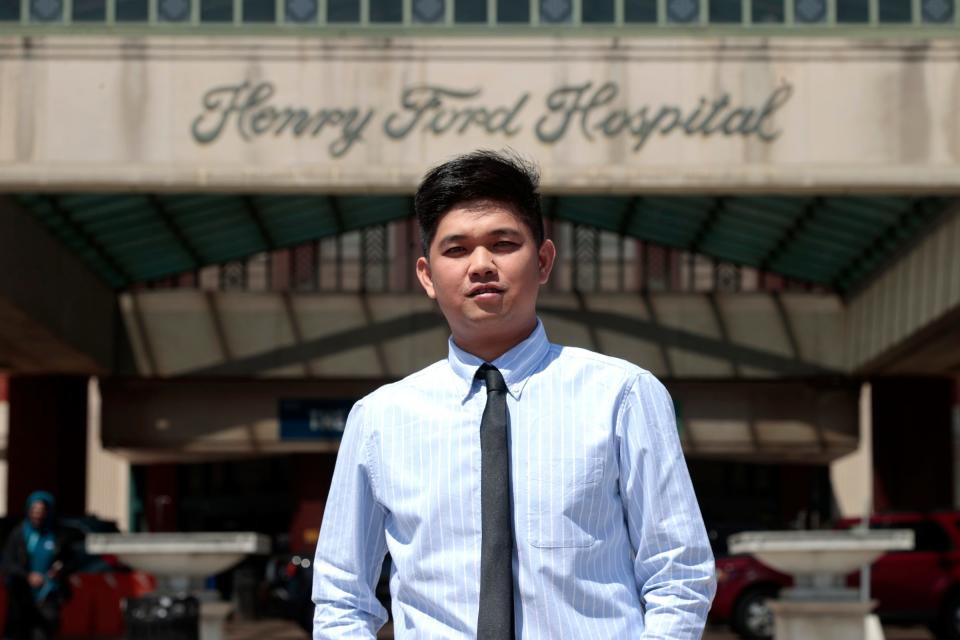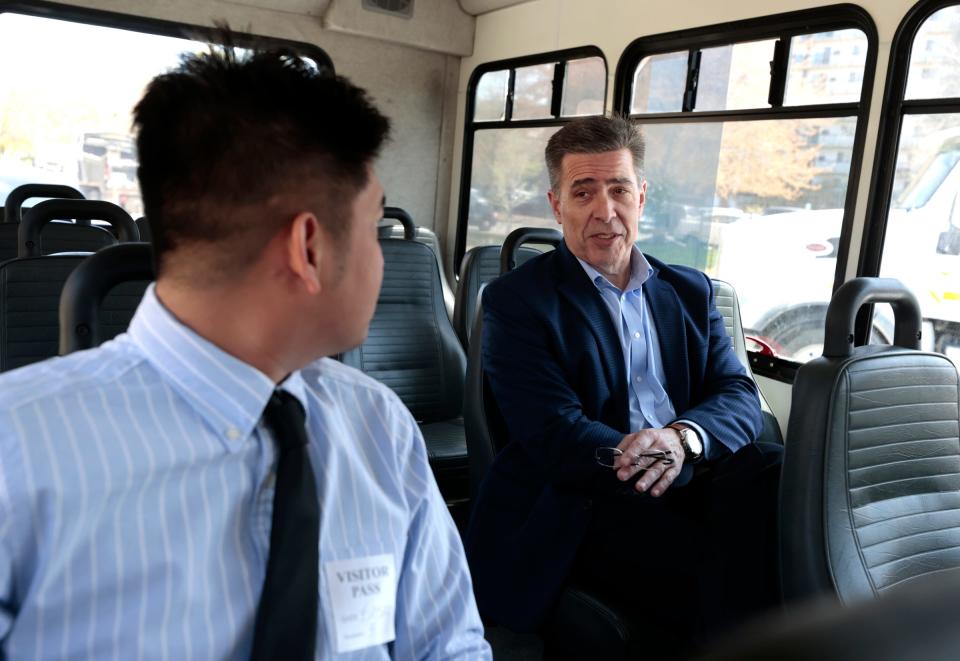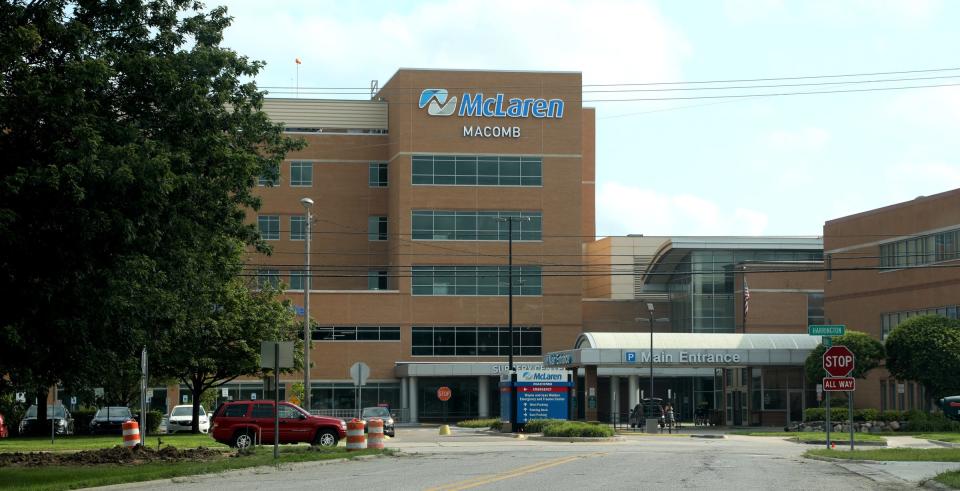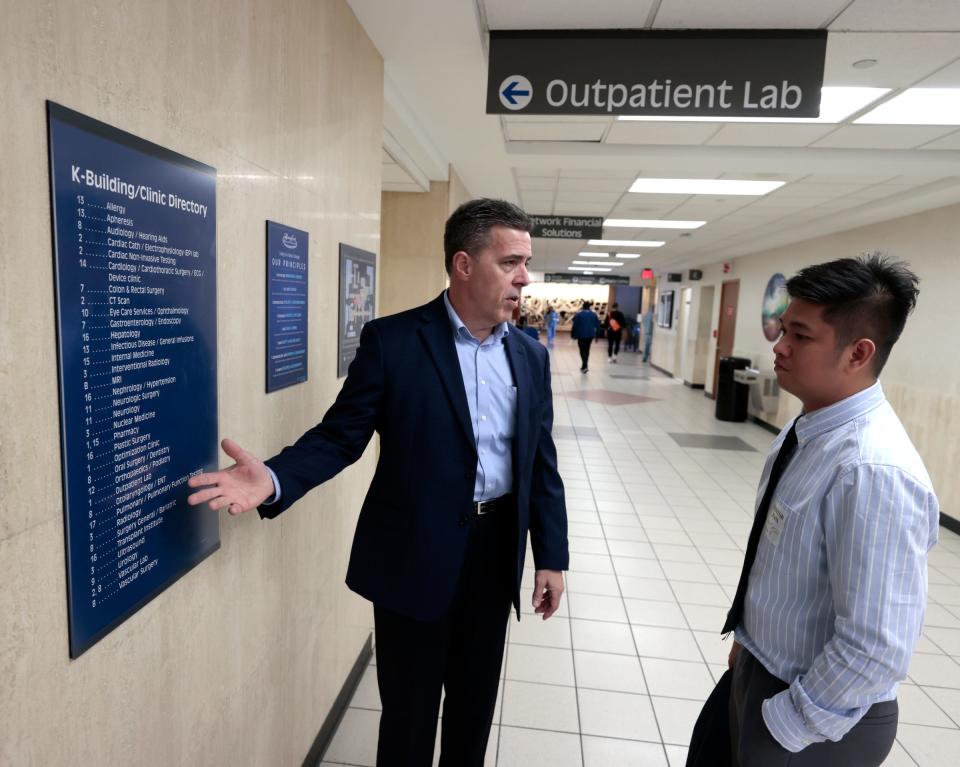Henry Ford looks to Philippines to combat worsening nursing shortage
Jerick Tabudlo left his home in the Philippines on Monday, and 16 hours later, stepped off an airplane at Detroit Metropolitan Airport into a new life as an operating room nurse at Henry Ford Hospital.
He’s the first of as many as 600 registered nurses from the Philippines who will take jobs through 2025 as part of a historic international hiring wave by Detroit-based Henry Ford Health.
"It's exciting," Tabudlo, 29, said Thursday, on his first visit to the hospital. "Where I had my experience in the Philippines was at a hospital with a 100-bed capacity." Henry Ford has 877 licensed beds, "so it's a much bigger hospital catering to more sophisticated cases from different cultural and socioeconomic backgrounds."

The health system’s leaders are putting their faith in Tabudlo and other foreign nurses to help ease a staffing shortage that has forced it to shutter operating rooms and slash the number of beds it can keep open.
“We don't think that this is going to close or fill every position that we have, but it's a piece of how we do that,” said Scott Ragland, director of vendor contracting and centralized staffing for the six-hospital health system.
US is 1 million to 2 million nurses short of needs
The nursing shortage is at crisis level not just for Henry Ford, which has 33,000 employees, of whom about 6,500 are registered nurses, but for hospitals across the state and country.
Since 2020, Michigan has lost 1,700 staffed hospital beds because of a lack of staffing — creating longer waits in emergency departments; difficulty transferring patients to hospitals better suited to their needs, and fewer services, particularly in rural areas, according to the Michigan Health and Hospital Association.
In March, Michigan hospitals had 27,000 open jobs, said Brian Peters, chief executive officer of the association.
More: Nearly 4 in 10 Michigan nurses say they plan to quit, new survey shows
More: 'Multi-facility outbreak' of deadly, drug-resistant fungus wallops Michigan hospitals
Nationally, the shortage of nurses is estimated to range from 1 million to 2 million, depending on the source of the data, Ragland said. Michigan’s share of that, he said, is at least 100,000.
“A large chunk of that is because we did have a number of folks who stepped out of the workforce during the pandemic,” he said. “They were people who were at retirement age but were still working who said, ‘Enough's enough. I'm going to retire.’ "
Others close to retirement age made the same decision. "And then there were people who decided to go work in other careers. So it exacerbated the challenge that existed even pre-pandemic.”
That’s a chasm that students graduating from nursing schools can’t fill.

“Nursing schools nationally graduate about 200,000 nurses a year,” Ragland said. “So when you look at the fact that we're only bringing 200,000 new people into the workforce, and we're already 1 million-plus folks short, plus people every day are reaching retirement age and stepping out, we simply don't have the pipeline in the workforce to ever really close in that gap.”
Exacerbating the crisis is the fact that about 39% nurses working in Michigan today say they plan to leave their jobs in the next year, according to a new University of Michigan study. Of the newly trained nurses surveyed who are younger than 25, 59% said they planned to leave the profession. "That really says to me that we have a problem with our workplace," Christopher Friese, a professor of nursing, health management and policy at the University of Michigan and director of the Center for Improving Patient and Population Health, told the Free Press for a previous article.
Ragland said Henry Ford's recruiting efforts are multipronged.
“We continue to work on strategies here with our local academic partners, our nursing schools, to figure out how do we grow the pipeline locally as well," he said. “It’s not a one-strategy model. This is one piece of the overall strategy of how do we strengthen the nursing workforce in southeast Michigan.”
A history of Filipino nurses in America
Early in the coronavirus pandemic, Henry Ford leaders knew they couldn’t wait for a reprieve in the staffing crisis. It might never come.
“We are facing an extreme challenge with our talent with our pipeline across the board," said Wright Lassiter III, then CEO of Henry Ford Health, during a panel discussion at the 2021 Mackinac Policy Conference.
The health system upped recruiting efforts. It looked to Canada to boost its workforce, and now has 590 Canadian nurses on staff. It brought in travel nurses, too, shelling out premium pay that nationally averages more than double what staff nurses earn, according to Becker’s Hospital Review.
But that wasn’t enough. Henry Ford had to get more creative to fill hundreds of nursing vacancies.
“We are now doing something we haven't talked about in a long time, and that is importing nurses from other countries,” Lassiter announced on that September day in 2021.
Namely, the Philippines — a country that decades ago supplied nurses when there were shortages in the U.S.
“The Philippines has historically had a pool of talent, of nurses trained very similar to what we have here in the United States,” said Eric Wallis, Henry Ford’s chief nursing officer. “They are obviously very proficient with English, and so the care that they deliver in country and their training, etc., is very comparable to what we experience. It makes their onboarding and their transition a lot easier than other places in the world.”
More: Michigan has a shortage of primary care doctors: What's causing it
More: University of Michigan Health, Sparrow combine to form $7B system
Additionally, the Philippines has a surplus of nurses, he said.
“They're actually producing more nurses than they have need for in country, and so economically, it's almost an export for them,” Wallis said. “A lot of these folks, when they do come to other countries — the United States, U.K., the EU — a lot of their income goes back to support their family members … because it's so much greater than they would make as a nurse in the Philippines.
“The government there has been very supportive of creating and exporting some of their talent in health care, and particularly with nurses."
400 Filipino nurses have accepted Henry Ford offers
But it took nearly two years from when Lassiter made that announcement to bring Tabudlo, the first registered nurse in this wave, from the Philippines to Detroit.
“We have authorization to recruit up to 600 nurses,” Wallis said. “We've got just a little over 400 offers that we've made to Filipino nurses that have been accepted.”

More: University of Michigan Health, Sparrow combine to form $7B system
More: 3.17 million Michiganders must reapply for Medicaid. Why it matters now.
Those nurses must clear medical licensing and immigration hurdles before they can come to the U.S.
“We expect the total time frame from offer to when they are here could be anywhere from 14 to 20 months,” Ragland said.
The timing is slowed by U.S. testing requirements, along with a complex visa process managed by the U.S. State Department.
State Department puts visa approvals on hold
“Every year, the U.S. government decides how many visas are going to be issued, and throughout the year they kind of monitor how many visas they've issued,” Wallis said. “This past month, they looked at that math, and determined that they maybe are a little bit oversubscribed for this current federal fiscal year and so they slowed the process down.”
The issuance of new, employment-based visas to workers from the Philippines is on hold at least until Oct. 1, when the new federal fiscal year starts, a U.S. State Department spokesperson told the Free Press.
“We cannot predict when wait times will return to previous levels,” the spokesperson said. “The annual limit will reset with the new fiscal year in October, and worldwide demand for EB-3 visas will be evaluated against the annual limit for (fiscal year) 2024 to determine adjustments to the final action dates at that point. … EB-3 is the immigrant visa category most commonly sought by nurses, however health care workers may also be recipients of other categories of immigrant visas, including family-based immigrant visas.”

Henry Ford’s leaders are encouraging lawmakers to pass legislation that would speed up the process for international nurses looking to come to the U.S. to help alleviate the shortage.
“We are having conversations with our government affairs folks and our local elected officials to try to help us in that space,” Wallis said. “Sometimes, even though our government is trying to do the right thing and manage immigration appropriately, there's unintended consequences to that if we don't look at all the nuances to those decisions.
“We’re in the process of advocating and saying we really need this to be reevaluated and think about the challenge that's going on in the health care sector in the United States and how this is making the problem worse, not better.”

Other hospital systems also seek international help
McLaren Health Care, which has 14 Michigan hospitals, also is looking beyond U.S. borders to recruit nurses and medical technologists.
Grand Blanc-based McLaren posted more than 150 open nursing positions to its website in the month of April alone and is offering signing bonuses of $20,000 for cardiac care registered nurses at its Bay City hospital.
It already has some Canadian workers and now is seeking nurses and medical technologists from the Philippines, Nigeria, Kenya, Qatar, the United Arab Emirates and Saudi Arabia.
“We’re proud to say that our first set of offers recently went out with more to follow in the coming weeks,” said Kimberly Keaton Williams, vice president of talent acquisition and development and chief diversity officer for McLaren. “We anticipate welcoming a group of registered nurses and medical technologists to the state for placement at our facilities in the second half of 2024.”
Trinity Health is doing the same.
About 100 international workers — including some from the Philippines — already are employed by the Livonia-based health system, said Shana Lewis, vice president of human resources-talent acquisition.
Trinity operates 88 hospitals in 26 states, including eight in Michigan. Of the roughly 100 international workers systemwide, six are working in Michigan, Lewis said.
More: Maternal mortality jumped 35% during pandemic's 1st 9 months, MSU study shows
More: U-M to begin prescription drug delivery by drone in 2024
“We expect to hire an additional 200 nurses in Michigan and several hundred more across our national system over the next two years,” Lewis said. “While we are excited about the opportunity to capture a broader workforce, we are being thoughtful in ensuring we have the right infrastructure to support long-term retention and high engagement."
Corewell Health, Michigan’s largest health system — born of a 2022 merger between the former Spectrum and Beaumont Health — also told the Free Press it is working to recruit international nurses to address the staffing crisis.
Though Corewell didn’t provide details, spokesperson Beth Cranson said its efforts to bring nurses from abroad, “complements the nurse scholar programs at Grand Valley State University and Oakland University, which are designed to increase the talent pipeline.”
Filipino nurses make 3-year commitment to Henry Ford
Tabudlo met some co-workers for the first time Thursday at Henry Ford’s headquarters and took a shuttle bus to its main Detroit hospital.
"They always say that I'm courageous to be coming here alone, but I'm just excited because it's a new clinical environment and there are so many different specialties here," he said. "I'm a person who wants always wants to learn."
Tabudlo and the other nurses who come from the Philippines to work for Henry Ford will be paid at the same rate as all other nurses on staff, Wallis said, based on experience. Salaries range from $70,000 to $100,000 a year.

“They do sign an employment agreement of three years with the organization,” Ragland said. “We do as much as we can on the front end to make sure that we're aligning them with the opportunity that sets them up to be successful.
“We do pay for pretty much the majority of their immigration journey. However, there are some that are bringing maybe their family members over or there's an added cost to that. We are advancing them funds to help them do that.
“We don't want there to be any barrier to put them in a position where they want to change their mind. So we do provide advances and once they are on the job and on the payroll, we work out a very amenable payback schedule for them that we think is going to work out nicely for them.”
The health system contracts with a housing company to provide an apartment for the first month and other necessities.
“We will provide them with the first 30 days of housing ... a one-bedroom or two-bedroom ... furnished apartment," Ragland said. "These apartments will be located within as close proximity to the site hospitals as possible because, again, most of these folks will not have ... their own transportation and many of them will not be aligned with any other family or friends here."
The housing contractor will stock the refrigerator with a grocery starter package, and provide other help, too, Ragland said.
More: Michigan hospitals get federal grants to be ready for the next pandemic
More: U-M study: Manufacturing jobs associated with higher risk of ALS
“They'll help them on their very first day here to apply for a Social Security card, and if they do plan to drive, we'll get them started on the driver's license process,” he said. “So it's really everything from A to Z. If the nurse is bringing over a family where kids are going to need to be registered in the schools, they'll assist with that process, and help them find the local churches.”
Tabudlo is staying within walking distance of the hospital, but just in his first few days of living in the Motor City, he's come to realize that he needs a Michigan driver's license and a car.
"We often use public transportation in the Philippines, but here, I think a car is a necessity," he said. "The establishments and the facilities are too far from each other here."
Mentors ease the transition
The new nurses will have mentors, too.
Some of the nurses from the Philippines who came to work for Henry Ford during earlier staffing shortages in the 1980s to the early 2000s are still employed by the health system, Wallis said, and are helping the newcomers get adjusted.
“They're extremely loyal to the organization, they’re hardworking, and they're great nurses,” Wallis said.
Among them is Wilson Rapanut, 52, of Sterling Heights, who moved to Lubbock, Texas, in 2003 for a hospital nursing job from the same part of the Philippines as Tabudlo. He worked in Texas for eight years before moving to Detroit for an operating room nursing position at Henry Ford.
Rapanut remembers the challenges of moving to a foreign country to start a new life.
“When I came first in the United States, I was very excited and terrified as well because I don't know anybody,” Rapanut said. “I wanted to move into the U.S. to pursue my dream.
“We were lucky because the first nurses who came before us, they helped us. We needed groceries so they could drive us to the grocery store, things like that. And then the hospital partnered with a credit union and a car dealership so we could get a car.”
Rapanut said he is confident Tabudlo will be successful in the operating room at the Detroit hospital; his first shift is May 2.
“With all his experience, I think the transition will be not that hard for him," Rapanut said. "He has OR experience already. ... The only thing is that the technology is more advanced here. So that's the only struggle he is going to have is the technology. Back home we don't have the robots. … Here, we have robotics.
“I'm just to advise him, make him more comfortable in there. I think seeing me, as another Filipino, too … it will be more comfortable for him.”
Leaders expect international recruiting needs to ease
Though an influx of 600 new nurses from the Philippines will definitely help the staffing shortage at Henry Ford, Wallis said it can't be the only strategy the health system uses to fill all the vacancies it has now or in the future.
"Part of what we're talking about now is what is our ongoing strategy," he said. "I don't think the nursing workforce is going to be completely fixed in the next couple of years. It's going to take longer-term work across the country to do that."
But he can envision a time when the need for international recruiting won't be as urgent.
"We want to get to a place where maybe we're looking at 25 to 50 international nurses a year coming not only from the Philippines, but looking at other places around the globe where the immigration process is reasonable, the training is appropriate and the English proficiency is there," Wallis said. "How do we look at international recruiting as a whole as a part of our talent strategy?"
Contact Kristen Shamus: kshamus@freepress.com. Follow her on Twitter @kristenshamus. Subscribe to the Free Press.
This article originally appeared on Detroit Free Press: Henry Ford looks to Philippines to combat nursing shortage

